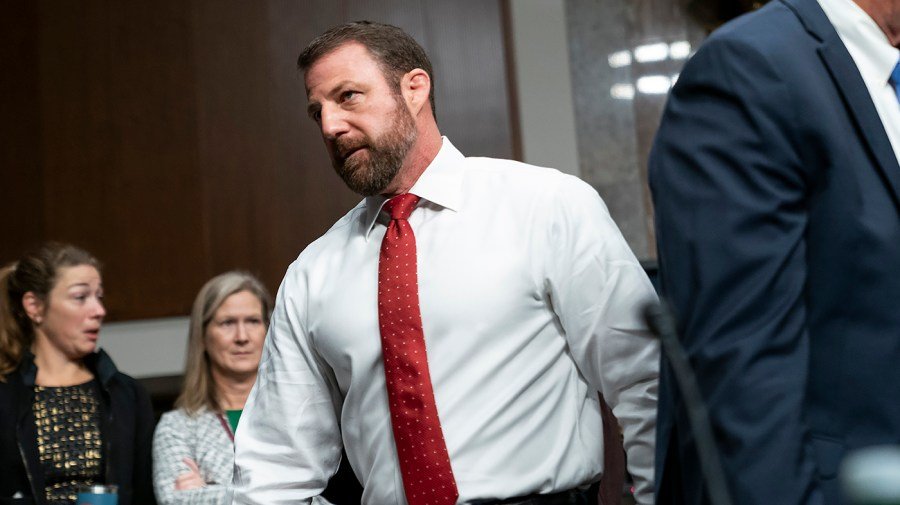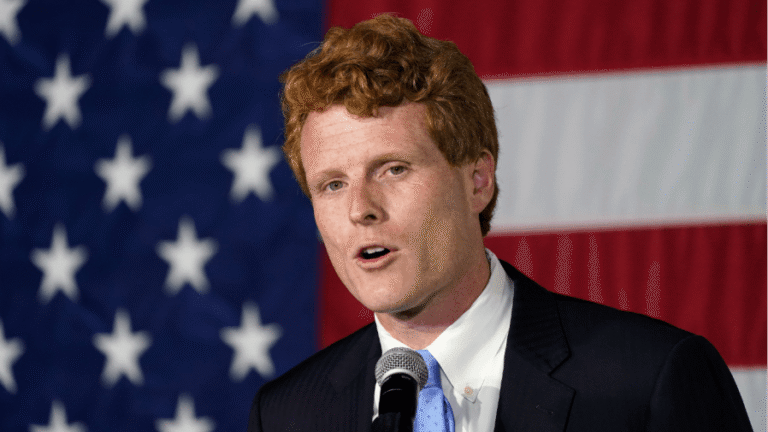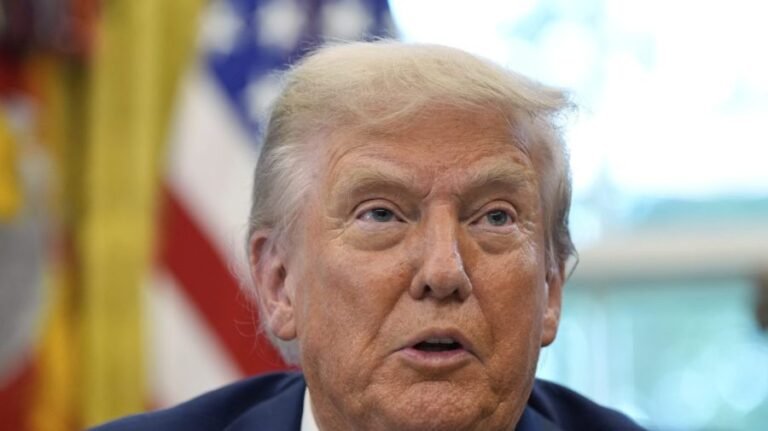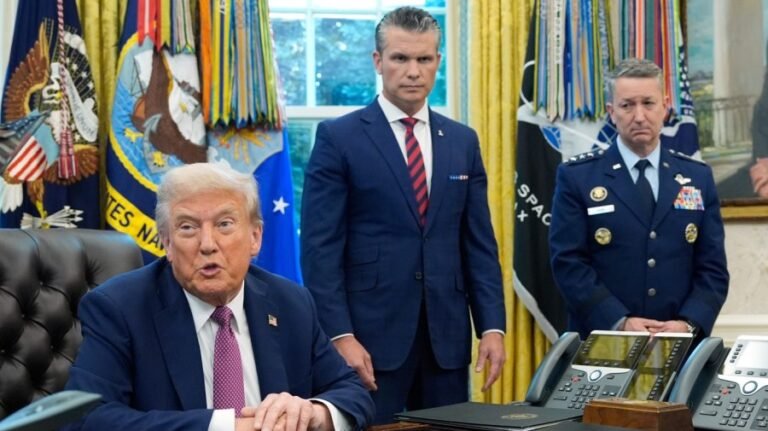
Sen. Markwayne Mullin (R-Okla.) is standing in the way of a bipartisan push to tighten sanctions on the country of Georgia, which lawmakers and advocates say is the best way to stand up for pro-democracy forces and counter Russian, Chinese and Iranian influence in the country.
Mullin is blocking passage of the MEGOBARI Act, bipartisan and bicameral legislation that codifies sanctions against officials in the ruling Georgian Dream (GD) party for human rights abuses, corruption, undermining democracy and deepening ties with American adversaries.
In a last-minute push in late August, Mullin succeeded in getting Senate Majority Leader John Thune (R-N.D.) to strip the bill from the managers package for the National Defense Authorization Act (NDAA), two congressional sources confirmed to The Hill.
Earlier this year, he blocked a request to pass the bill by unanimous consent. The bill is largely noncontroversial. It passed out of the Senate Foreign Relations Committee in March and the House passed its version of the bill in May. The vote was 349 to 42.
While Sen. Rand Paul (R-Ky.) is also opposed to the bill, Mullin’s opposition stands out for the lengths he has taken to block the legislation from going to the floor.
“There’s a lot of people on the record supporting this legislation,” said one congressional source, who requested anonymity to discuss legislative deliberations.
“It was almost included in the NDAA last year. It has passed the House and it was passed out of committee this year. So the fact that one senator could kill it is quite disappointing.”
Mullin’s stance has also raised eyebrows because it marks a major reversal from positions he held five years ago.
In 2020, Mullin criticized the ruling Georgian Dream party as cozying up to “American hostile rivals and enemies” and said it was making it difficult and dangerous for American companies to operate in the country.
In a short interview with The Hill this week, Mullin cited a “better relationship” with Georgia’s Prime Minister Irakli Kobakhidze, who is also chairman of Georgian Dream, as one of the reasons for opposing the MEGOBARI act, warning the legislation would harm U.S. ties with Tbilisi.
“I understand kind of where they’re [Georgian Dream] trying to get to. I also understand the direct influence that Russia is having and kind of stirring up disdain, I guess, inside the government,” Mullin said.
“And so I want to be able to work with them before we throw sanctions on them. I want to work with them to see how they can, you know, have true sovereignty, to get away from the overbearing influence of Russia.”
In his 2020 op-ed, Mullin highlighted two U.S. companies facing challenges in Georgia. He pointed to the Conti group, which in 2019 pulled out of a $600 million investment in a Black Sea port because it could not secure approval from the government. And he raised concerns that Frontera Resources, a Texas-based oil and gas company, was being targeted with stifling regulations.
Frontera’s operations in the country improved in the aftermath of that pressure campaign, and a Ministry of Economy decision to terminate a contract with the company was reversed.
Mullin told The Hill that his opposition to MEGOBARI was not influenced by Frontera’s improved relations with the government.
He said it’s been between a year and a half to two years since he’s had contact with the Texas firm. The company’s founder, Steve Nicandros, has donated nearly $6,000 to Mullin’s campaigns since 2020, according to data from Open Secrets.
“It doesn’t make any difference what company it is,” Mullin said of his advocacy for Frontera and Conti. “If we’re going to have investments there, they need to make sure their investments, meaning U.S. investments, that investments need to be protected and have confidence that they’re going to be able to see the project through without being threatened to be taken over. I think we’re there. But some of the inter-government politics is dicey. I mean, it’s a tough area.”
The Hill reached out to Frontera Resources for comment.
Mullin’s optimism toward Georgia’s leaders is perplexing to democracy activists and congressional sources, who argue the country is clearly moving in the wrong direction, with increased corruption, democratic backsliding, and deepening ties with adversaries over the past five years.
“That a Senator is going this far to defend the pro-China government in Georgia is puzzling and very swamp-like behavior. This is a regime that is constantly defending China and Iran and just today was insulting President Trump,” said one Republican aide.
Eka Gigauri, Executive Director at Transparency International Georgia, who has testified in front of the Senate Foreign Relations Committee on the ruling party’s repression, said MEGOBARI was the “biggest problem” for Georgian Dream.
“They think that it will be disaster for them,” she added.
“I understand everyone has right to express him or herself, there are some reasons why one or another might resist to such a bill,” Gigauri said.
“For me, it’s not understandable how indirectly this regime might be supported by anyone in the US,” she added.
In recent years, Georgian Dream has copied Russian legislation to crack down on civil society, arrested political opponents, stifled independent media and halted its efforts to join the European Union, in violation of the country’s constitution.
Protesters have been on the street nearly every day for a year since October 2024 parliamentary elections were roundly condemned as not free and not fair.
And the influence of Russia, China and Iran in the country has only grown. In 2024, a Chinese-led consortium took over the bid for a deep-water port in the Georgian Black Sea coastal town of Anaklia, after the U.S.-based Conti withdrew from the project.
Georgian Dream has held back joining international sanctions on Russia over its invasion of Ukraine and has worked to mend ties with Moscow, accusing the U.S. and Europe of trying to push Georgia into conflict with the Kremlin. Russia maintains a military occupation in two territories in Georgia – South Ossetia and Abkhazia – since invading and backing separatist movements in 2008.
Georgia restarted direct flights with Russia in May 2023 and, while trade with Russia has decreased over the years, the country remains Georgia’s fourth-largest export market, according to 2023 data, and third-largest importer.
Ties between Iran and Georgia have also deepened. Between 2013 and 2025, the number of Iranian businesses registering in Georgia quadrupled, Iranian foreign direct investment has grown by five times, and trade has tripled, according to an analysis by Transparency International Georgia.
In 2024, Kobakhidze attended the funeral of former Iranian President Ebrahim Raisi and the inauguration of the new president, Masoud Pezeshkian, standing with a delegation including representatives from Iran’s terrorist proxies – Hamas, Hezbollah and the Houthis.
The Trump administration has not lifted sanctions imposed by President Biden against Georgian Dream officials and its de facto leader, billionaire Bidzina Ivashvilli. MEGOBARI would go a step further by requiring the executive to investigate all members of the Georgian Dream party, as well as their immediate family members, for corruption or attempts to undermine Georgian sovereignty.
Mullin said he could not make a determination on the validity of Georgia’s October election results because he was not there to verify the conclusions of international observers, which included U.S.-funded NGOs like the International Republican Institute, which deemed the proceedings as not free and not fair. The European Union has called for an election re-do.
“I get that we have observers there, but I still feel like the best way – this is just me, maybe I’m old school – I like to put my hands on things,” Mullin said.
Asked if he didn’t trust international election observers, he said, “it has nothing to do with trust, I just verify.”
The Oklahoma senator said he last visited the country in 2021 and has plans to visit again. Asked if he could say when, he responded, “No, that’s not for you to know.”
Mullin criticized his colleagues as not having a full accounting of the picture on the ground.
“What I’m saying is, just, let’s make sure we have the ties,” he said. “When’s the last time we went there and visited them? When’s the last time you talked to them? When had we actually had diplomatic visitations from them, understanding where they’re moving, for the people that’s wanting the act [MEGOBARI] put in place?”
Sen. Jeanne Shaheen (D-N.H.), the ranking member of the Senate Foreign Relations Committee and co-sponsor of MEGOBARI, last visited Georgia in August 2024 and met with Kobakhidze. She left that meeting “disappointed” that the prime minister “did not make any suggestions about what he and his administration were willing to do to improve the relationship with the United States.”
In July, then-U.S. Ambassador to Georgia Robin Dunnigan put the blame on Georgian Dream for rejecting outreach from Trump’s team, saying Ivanshvilli, the de facto party head, refused a letter from the president because he remained under U.S. sanctions.
When Georgian Dream leadership later sent a letter to Trump, Dunnigan described it as “threatening, insulting, unserious, and was received extremely poorly in Washington, extremely poorly.”
In public, Georgia’s prime minister has criticized the MEGOBARI act as “deeply hostile” and criticized Trump as “rebranding” the “Deep State,” referring to a conspiracy in which the GD accuses USAID and U.S.-funded groups like the National Endowment for Democracy as engaging in a plot to overthrow the government.
In a follow up letter on Sept. 1, Georgia’s President Mikheil Kavelashvili, elected by the Georgian Dream-controlled parliament, further criticized Trump as failing to stand up to the “Deep State.”
MEGOBARI’s supporters in the Senate are pushing for a pathway to passage, despite Mullin and Paul’s objections. Sen. Roger Wicker (R-Miss.) told The Hill on Tuesday that MEGOBARI could be added as an amendment to the NDAA despite earlier being stripped from the bill. Shaheen, in a statement to The Hill, said she will continue to work with Republicans to ensure its final passage in the Senate.
“There continues to be strong, bipartisan and bicameral support for the MEGOBARI Act in response to the deteriorating political situation in Georgia and widespread agreement that actors responsible for undermining Georgia’s democracy, Euro-Atlantic aspirations and our longstanding bilateral relationship should be held accountable,” she said.


